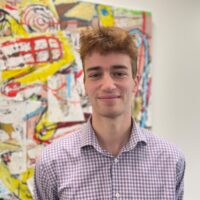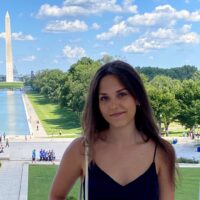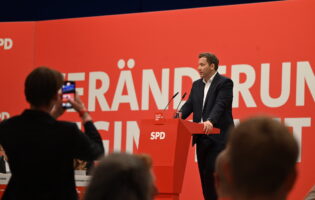
Getty Images
Social Divisions and Questions of Identity in Germany and the United States

Aaron Wheeler
Halle Foundation/AGI Intern
Aaron Wheeler is a research intern at AGI for the summer of 2023. He assists resident fellows with their research projects, manages databases, and helps organize and document events.
Mr. Wheeler is currently pursuing a bachelor’s degree in International Politics at Georgetown University’s Walsh School of Foreign Service. He is also pursuing minors in German and History. He is concentrating his studies on issues related to immigration and climate change policy within the European Union. He is also interested in transatlantic security and trade policy.
Mr. Wheeler completed his first two years of undergraduate school at the University of Pittsburgh before transferring to Georgetown, where he pursued a double major in Political Science and German with a certificate in European Union Studies.

Emma Levi
Halle Foundation/AGI Intern
Emma Levi is a research intern at AGI for the summer of 2023. She provides research support to AGI’s programs, monitors the media, and assists with AGI’s programs, events, and databases.
Emma is currently pursuing a bachelor’s degree in Political Science and German from the University of California, Berkeley. She is passionate about transatlantic exchange and dialogue, specifically between the EU and the United States. Emma has completed coursework on topics such as European identity and democracy, as well as German history and politics. Previously, she studied abroad at the Humboldt University in Berlin in Summer 2022. At Berkeley, Emma is a research assistant for the Institute of European Studies and has held previous internships for both European startups and nonprofits.

Fiona Muhleisen
Halle Foundation/AGI Intern
Fiona Muhleisen is a research intern at AGI for the summer of 2023. She assists resident fellows with their research projects, manages databases, and helps organize and document events.
Ms. Muhleisen is currently pursuing a bachelor’s degree in International Relations at Pomona College with a minor in German Studies. She has completed coursework on topics including the intelligence community, U.S. foreign policy, German film, and German contemporary literature. Her research interests center on national security and the implications of democratic backsliding on transatlantic relationships.
Aside from her academic pursuits, Ms. Muhleisen is a research assistant for Pomona College’s German Department developing a course about Swiss film. In this capacity, she explores the European film industry and entertainment law. Ms. Muhleisen is fluent in German and Hungarian.
Consequences for Politics and Society
An Exchange Outside of the Metropolitan Areas
A Three-Year AGI Project – Final Conference Summary
In recent years, open communication and compromise have been neglected in many communities where individuals retreat to a space in which they feel most secure. The AGI program “Social Divisions and Questions of Identity in Germany and the United States” aimed to establish new connections within and between communities by bringing individuals together for an honest exchange of important societal issues.
The three-year project addressed divisions in both German and U.S. societies by focusing on a number of underlying factors including social, demographic, economic, geographic, and identity dynamics. It highlighted personal exchange and open communication in order to reconnect people and overcome the existing polarization and divide, both within communities and across borders. During each program year, participants visited one city in Germany and the United States for week-long personal meetings with local government and civil society stakeholders to learn about the cities’ efforts to develop cohesive communities. The selected German-U.S. sister cities were: Akron, OH, and Chemnitz, Saxony (year one); Buffalo, NY, and Dortmund, North-Rhine Westphalia (NRW) (year two); Glendale, AZ, and Memmingen, Bavaria (year three).
During a conference on June 13, 2023, representatives from each program year reflected on their experiences and lessons learned and shared ideas and possible solutions that may find application in communities, large and small, across Germany and the United States.
Panel 1: Akron and Chemnitz
Akron and Chemnitz have undergone periods of significant economic fluctuations, alternating between prosperity and economic downturn. During the late nineteenth and twentieth centuries, industrialization played a pivotal role in driving population growth in both cities. However, globalization reversed this trend, sending jobs elsewhere. In the 1960s, Akron witnessed a decline in its population growth, and Chemnitz experienced a similar phenomenon after German reunification. Although both cities encountered a common challenge, their approaches to address the issue were vastly different. Germany’s government, for example, adopted a proactive strategy which allocated substantial funds to the Ruhr Valley for infrastructure investment and welfare programs. Without these welfare programs, the United States tends to encounter more pronounced spikes in unemployment during times of crisis despite generally maintaining lower overall unemployment rates compared to Germany.
Regarding political identity, participants highlighted significant differences in civic engagement. Civic participation in Akron appeared to be considerably lower than in Germany, with Akron’s mayoral race receiving a low voter turnout of just 20 percent. While voter participation is higher in Chemnitz, one-quarter of seats in the city council are held by far-right parties, which affects city council dynamics and effectiveness. Panelists noted that initiatives like the Akron-based On the Table, which invites residents to share a meal with their local politicians, could be the key to increasing voter turnout. Creating avenues for constituents to find common ground through On the Table and Akron’s Exchange House can help individuals feel empowered and more engaged in the political process as a whole.
There were also a number of demographic differences between the two regions. Chemnitz was described as relatively homogeneous, while Akron showcased a diverse population with large African American, Nepali, and Bhutani communities. However, both Akron and Chemnitz experienced the same “brain drain” phenomena, wherein individuals migrate to locations that better align with their political ideologies and offer improved job prospects. With both cities facing questions of population retention, immigration will continue to play an important stabilizing role. Both cities rely on immigrants to sustain their local economies, and the North Hill Community Center in Akron hopes to foster greater social cohesion and sense of belonging for immigrants, incentivizing a longer-term settlement in the area. Both Akron and Chemnitz also hope to leverage their university populations as a means to combat the “brain drain” and secure their economic futures. In Akron, engineering students are connected with manufacturing industry leaders who hope to funnel young talent into these sectors with the goal of revitalizing them. Chemnitz employs a similar approach by facilitating the creation of start-ups by university students and recent graduates.
Finally, participants discussed the shared struggles of education in both countries. Germany and the United States are dealing with teacher shortages and an increasing lack of local control in districts. In Germany in particular, there is a growing educational divide attributed to the unequal access to technology, including iPads and laptops, within classrooms. To ensure equitable educational opportunities for all students, one participant stressed that digital inclusion must be prioritized within German schools. In Akron, initiatives like the Mayor’s Youth Leadership Council and the Exchange House aimed to provide additional educational programming outside of schools and engage community members. Various foundations in Chemnitz, including AGIUA e.V. (Migrationssozial- und Jugendarbeit), the Sächsischer Flüchtlingsrat (Saxonian Refugee Council), and the Women’s Center Lila Villa, offer support in areas such as migration, education, and language acquisition. Such initiatives support new and long-time inhabitants in their communities, offer diverse programming for citizens, and contribute to building social cohesion.
Panel 2: Buffalo and Dortmund
With similar boom and bust industrial histories in response to globalization and increased market competition after World War II, Buffalo and Dortmund sought out a formal Sister City relationship. Economic, regional, electoral, and media-related trends have remained parallel by and large, allowing program participants to draft meaningful policy suggestions to strengthen the transatlantic relationship and overcome social divisions in each locale.
The personal meetings and cultural exchanges in Buffalo and Dortmund, respectively, revealed a notable resemblance between the two cities. An analysis of the local workforce and economy reveals how both Buffalo and Dortmund overcame the manufacturing losses of the late twentieth century and are now transitioning to a knowledge-based economy. By leveraging what both cities have already built and focusing on internal development, entrepreneurial innovation and technical know-how are poised to shape the future. For instance, Buffalo and Dortmund are undergoing urban renewal renovations to repurpose industrial buildings and structures for programs relating to the arts and culture. There are also political similarities between Buffalo and Dortmund. On the one hand, Buffalo is a blue stronghold in a county and state known for their strong Democratic presence. On the other hand, across the Atlantic, the SPD has held the most seats in Dortmund’s city council since the end of World War II. Although the far-right AfD has a five-seat presence, popular support has waned since the most recent elections three years ago.
A common history also cements itself in Buffalo and Dortmund’s shared social values and worldview. For example, each city shares a commitment to community unification as demonstrated by their respective refugee integration and support organizations. Civil society actors in Buffalo and Dortmund believe that resettlement is not only a humanitarian obligation, but a precursor to a thriving economy and welcoming social environment. In the same vein, community dedication also reflects itself in how media and information consumption is traceable to local daily news sources in each city. The Buffalo News reaches about one-fifth of the population, while Ruhr Nachrichten and Westfälische Rundschau each have a circulation of around 200,000. Although national public broadcasting is available to both communities, their trust lies more so with local news outlets that provide a sense of familiarity and regional knowledge. The local papers also heavily report on the cities’ respective soccer and American football clubs and use the unifying power of sport to further imbue a strong blue-collar sense of community.
The panel’s recommendations for policy and practice included improving public transit, educating the public about climate change, and promoting ‘high-road’ development by avoiding trying to attract resources and talent from outside of the community and instead investing in people and infrastructure already present. Societal policy suggestions highlighted strengthening the Buffalo-Dortmund sister city relationship, using education to counter information manipulation, promoting cultural humility, and supporting local news to avoid news deserts (i.e. decreasing rates of daily paper-based news sources).
Panel 3: Glendale and Memmingen
Glendale and Memmingen are small yet growing, full of diversity, but also dealing with various challenges. Both cities lack adequate low-income housing that could accommodate their growing populations. In Glendale, homelessness was rampant having grown by 139 percent since 2020, and the local government was throwing resources into controlling the problem, rather than solving it. A growing migrant population in Memmingen had stretched the city’s housing, causing the government to build shelters for the asylum seekers to live in temporarily. As both cities seek to attract residents and create jobs, they must address housing needs in their communities.
The topics of climate and sustainability were central to the group’s visits to each city. In Glendale, which lies in the Arizona desert, climate change was apparent and harrowing. Water scarcity was a key area of focus for the cohort, as the area is susceptible to droughts, and the Colorado River, which has acted as Glendale’s water supply for decades, is facing its lowest water levels ever. The local government is acting very slowly on these issues, a concerning sign for a vulnerable city on the brink of crisis. There are other actors, such as Arizona State University in Tempe, working on sustainable solutions for Arizona. The group visited the ASU Global Institute of Sustainability and Innovation, where interdisciplinary working groups were developing sustainable solutions for the future of water, energy, urban transport, and green living. The institute firmly believes that the journey to zero-emissions begins with the development of sustainable cities, and they hope their green projects will be implemented not just in the Phoenix metro area, but across the world. In Memmingen, the cohort learned how the city was conserving energy through renewable energy resources such as solar panels. The city also plans to reduce its carbon footprint, including its ambitious goal to make the center city car-free by 2025.
Glendale and Memmingen are facing similar challenges in their education systems. The German public schooling structure can perpetuate social divisions and discrepancies, especially among immigrants and lower-income people. Migrant children (and those with immigration backgrounds) are often placed in less intensive schools (vocational-focused Realschule, as opposed to a university-track Gymnasium), which often did not afford them the opportunity to pursue higher education after their primary schooling. Teachers in both cities are underpaid and leaving the profession at alarming rates, often resulting in underqualified teachers filling the gaps. More inclusive curriculum was needed in the schools, one that represents the diverse communities in the United States and Germany and includes the pasts and perspectives of marginalized communities. History classes in public schools must allot more time to teaching the histories and cultures of the indigenous peoples that have called Arizona home for centuries, instead of merely teaching from the perspective of the American settlers. In Arizona public schools, the teaching of critical race theory and postcolonial transgressions is hampered by banned books and curtailed curricula. In Glendale, the group visited Native American historical sites and spoke with indigenous leaders from the Navajo and Hopi nations, where they learned about the history of Native Americans in Arizona. In Memmingen, the cohort learned about the city’s colonial past, as it gained its wealth from slave traders. Throughout Memmingen, street names and buildings continue to display racist terms and figures, clearly showing that the city has yet to fully address its colonial past. The group stressed the importance of colonial continuity, emphasizing the power in remembering, discussing, and reconciling with each city’s colonial past.
From their travels to the two cities, the group had many ideas about how each could foster more social cohesion. To combat the high levels of homelessness in Glendale, affordable housing options must be made available. To accommodate the large numbers of migrants coming to Memmingen, more housing options in general need to be built in the city. Remarking on the extremely inefficient public transportation around Glendale, the group posited that an eco-friendly transportation system would greatly benefit the city, as reliance on cars would go down, in turn lowering its carbon footprint. Furthermore, to quell the city’s water supply crisis, implementing initiatives such as no grass yards and a ban on private pools would prove very beneficial. For Memmingen’s issues with education, building a university in the city would help encourage children to engage more in their schooling, so that they can pursue more desirable and lucrative careers.
Learn more about the exchanges from this program, including articles, podcasts, and interactive StoryMaps:
This project is supported by the Transatlantic Program of the Federal Republic of Germany, funded by the European Recovery Program (ERP) of the Federal Ministry for Economic Affairs and Climate Action (BMWK).









